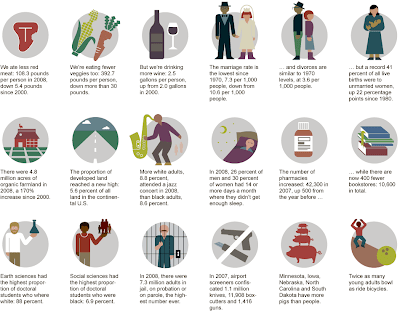Fifty years ago today, President John F. Kennedy stood up and delivered his
famous inaugural address, the takeaway line from which was, of course, "ask not what your country can do for you; ask what you can do for your country".
As Kennedy spoke to his nation at the height of the Cold War--just months before the construction of the Berlin Wall--there was significant uncertainty as to the future viability of capitalism and the U.S. way of life. Today, we find ourselves at a remarkably similar inflection point, beset by doubt and anxiety, with China threatening to play the role of a 21st-century Soviet Union.
Once again, we find ourselves wondering (and arguing) about the role of the state vs. the role of the individual, and what we as individuals must do to ensure the next generation of American prosperity. Kennedy's famous call to arms would be equally viable and important today, living as we do in an unprecedented era of entitlement.
Since Kennedy took the podium a half-century ago, federal government spending has certainly increased (albeit not linearly), but more importantly, our debt ratio has skyrocketed as government revenues have consistently failed to keep pace with spending increases.
Though Kennedy (and Johnson finishing out his term) succeeded at driving down levels of spending and debt, their gains were short-lived. In recent years, the trends toward increased spending and debt have been extended to troubling degrees. Simply put, no American generation since Kennedy's inauguration has asked for more from its government while providing less.
Note that the last two points on each chart represent projections based on an assumption of fairly robust economic growth over the next two years--if growth is slower than projected, the first chart will not experience the dip that is currently projected, and the second chart may go parabolic.
Our nation's response to the economic crisis of 2007-2008 was essentially the antithesis of Kennedy's plea--at every opportunity, we looked first to Washington to see what our politicians could do to ease our pain. We spent and spent and spent, but we sacrificed nothing in the way of increased taxes to support those new spending programs. Say what you will about the success or failure of the many programs enacted over the past few years--either way, the message from the American people was clear. Government must be the solution to our problems, because we are helpless to solve them ourselves.
If the 21st century is indeed to be another American century, this newfound relationship with government cannot continue. We must heed President Kennedy's words, and ask hard questions of ourselves--what can we do to help each other, to ensure the next generation of economic prosperity? A state, after all, is nothing but a collection of individuals--this is what Kennedy understood so well.
I have
mentioned here before my firm belief that the economic prosperity of our nation depends on our own ingenuity and a return to the entrepreneurial roots that once made this country great--and can once again. The confidence, self-reliance, and individualism that defined our nation's frontier era must never be forgotten. As one last call to arms, I'll turn to Kennedy's own words, from that same speech fifty years ago today.
I do not believe that any of us would exchange places with any other people or any other generation. The energy, the faith, the devotion which we bring to this endeavor will light our country and all who serve it. And the glow from that fire can truly light the world.
Well said.






















